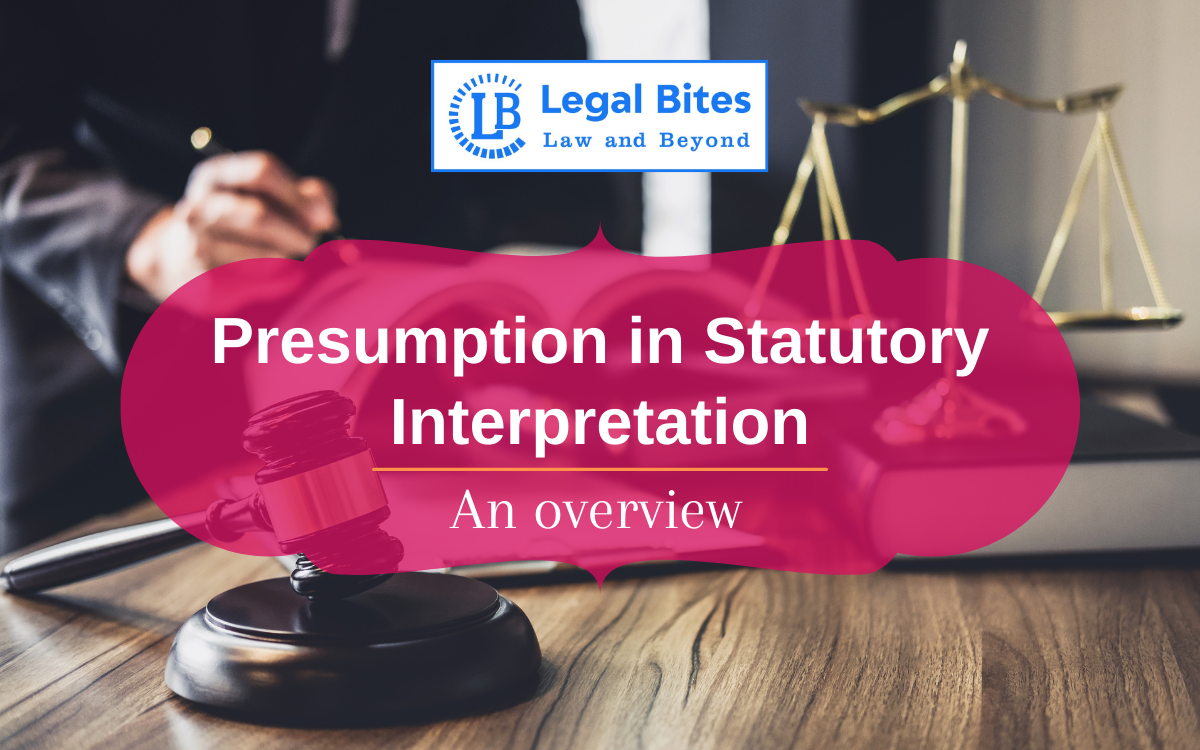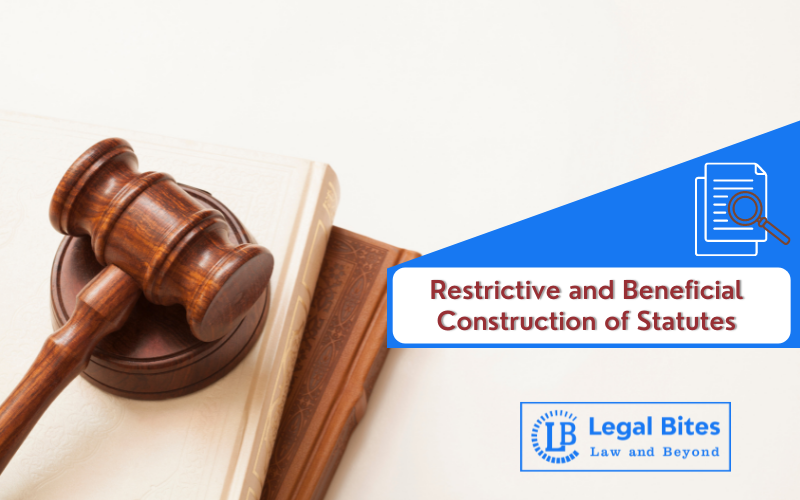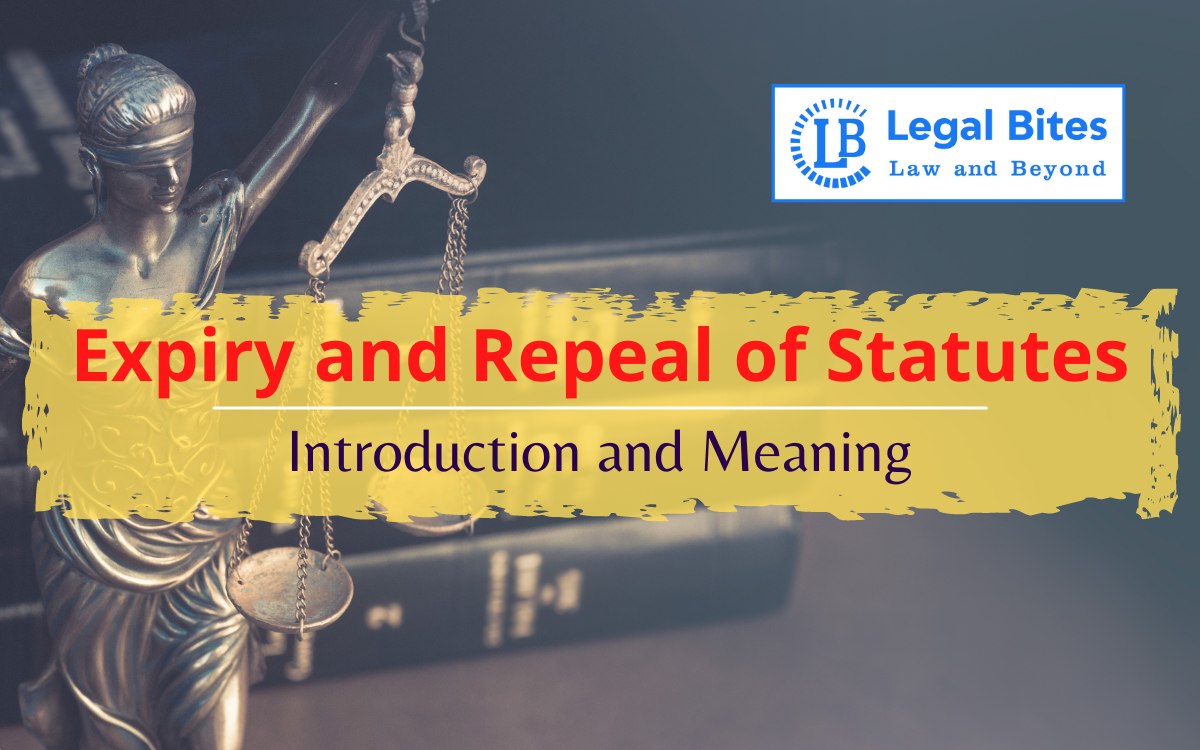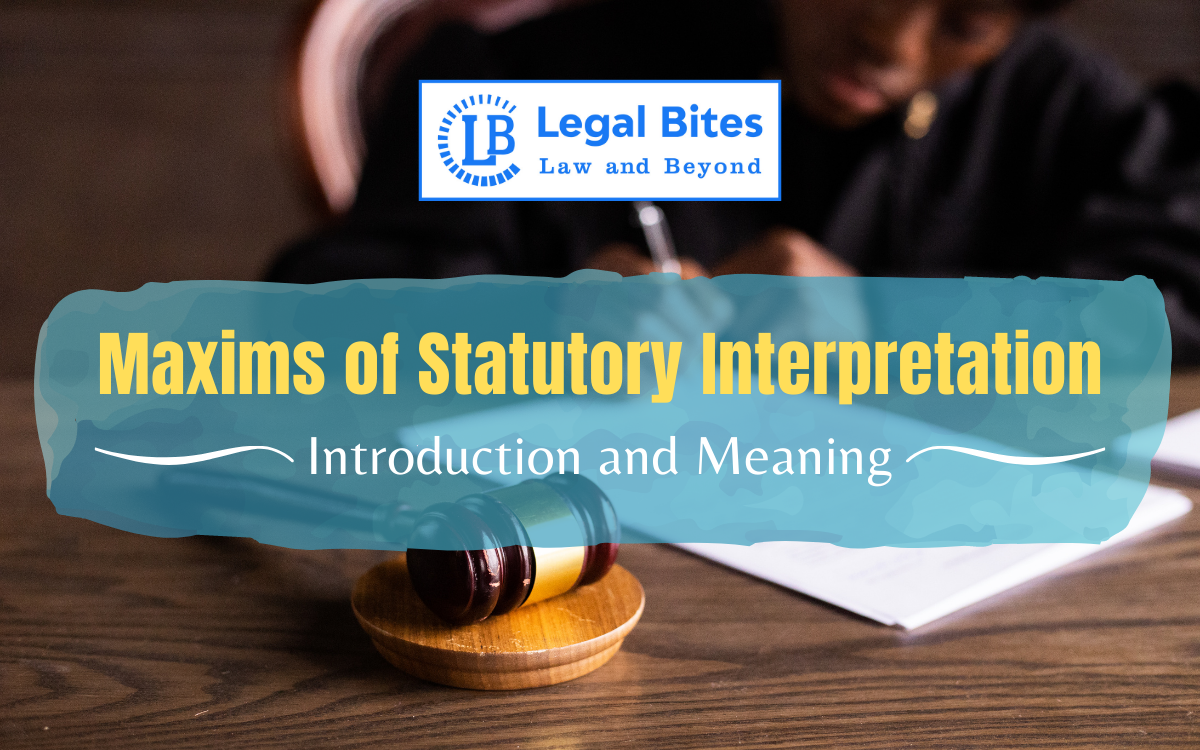Presumptions in Statutory Interpretation: An Overview
This article aims to provide a comprehensive overview of presumptions in statutory interpretation, their types, legal significance, and key judicial pronouncements shaping their application.;

Statutory interpretation is an essential judicial function that ensures the effective application of legislation in line with legislative intent. Among the numerous tools available to judges, presumptions play a vital role. Presumptions in statutory interpretation are legal inferences or assumptions that guide the interpretation of statutes when the wording is ambiguous or silent on a point. These are not hard rules but rebuttable aids that offer insight into what Parliament might...
Statutory interpretation is an essential judicial function that ensures the effective application of legislation in line with legislative intent. Among the numerous tools available to judges, presumptions play a vital role. Presumptions in statutory interpretation are legal inferences or assumptions that guide the interpretation of statutes when the wording is ambiguous or silent on a point. These are not hard rules but rebuttable aids that offer insight into what Parliament might have intended.
Meaning of Presumptions under Interpretation of Statute
In legal interpretation, presumptions refer to inferences or assumptions made by the courts regarding legislative intent or the operation of laws in the absence of express statutory language. These are logical or judicial conclusions that help determine the meaning of statutes where ambiguity exists or the text is silent.
Presumptions do not override the express words of the statute, but they serve as aids to interpretation. When the language of a statute is unclear or open to multiple interpretations, courts invoke certain presumptive rules or maxims to fill in the gaps or resolve ambiguity in a manner that aligns with justice, fairness, and legislative purpose.
Types of Presumptions in Statutory Interpretation
1. Presumption against Retrospectivity
Unless expressly stated, statutes are presumed to operate prospectively. Retrospective operation can upset settled rights, so courts resist such readings unless clearly intended by the legislature.
Govinddas v. ITO, AIR 1976 SC 1926: The Supreme Court held that a taxing provision cannot be given retrospective operation unless the language is clear and unambiguous.
The idea is that individuals should not be penalized or disadvantaged by a law that came into effect after their act or omission.
2. Presumption against Repeal by Implication
There is a strong presumption that Parliament does not intend to repeal existing legislation by implication. Two statutes will be harmonized as far as possible.
Ratan Lal Adukia v. Union of India, AIR 1989 SC 1415: The Court held that an implied repeal would only occur if two provisions are so inconsistent that they cannot stand together.
3. Presumption of Constitutionality
Courts presume that a statute enacted by the legislature is constitutional, placing the burden on the challenger to prove otherwise.
Ram Krishna Dalmia v. Justice S.R. Tendolkar, AIR 1958 SC 538: The Supreme Court laid down that unless a statute is manifestly arbitrary or discriminatory, it should be upheld.
This presumption ensures judicial deference to the legislature and protects statutory enactments from casual invalidation.
4. Presumption against Violation of International Law
Courts presume that the legislature does not intend to violate international law or treaties unless such intent is made explicit.
Gramophone Company of India Ltd. v. Birendra Bahadur Pandey, AIR 1984 SC 667: The Supreme Court held that courts must interpret domestic law in harmony with international obligations unless it leads to repugnancy.
5. Presumption against Ouster of Jurisdiction
Courts are reluctant to infer that a statute ousts the jurisdiction of civil courts unless the language used is express or by necessary implication.
Dhulabhai v. State of Madhya Pradesh, AIR 1969 SC 78: The Court laid down principles determining when the jurisdiction of civil courts may be excluded.
6. Presumption against Delegation of Essential Legislative Function
While delegation of legislative power is permitted, it is presumed that essential legislative functions such as formulation of policy are not delegated without express language.
Ajoy Kumar Banerjee v. Union of India, AIR 1984 SC 1130: The Court held that essential legislative functions must be exercised by the legislature itself.
7. Presumption of Mens Rea in Criminal Statutes
In criminal law, unless the statute clearly excludes it, courts presume that the offence requires a guilty mind (mens rea).
State of Maharashtra v. Mayer Hans George, AIR 1965 SC 722: Mens rea was presumed unless specifically excluded by the statute.
8. Presumption against Alteration of Common Law
Unless clearly expressed, a statute is not presumed to alter the common law.
Bangalore Water Supply v. A. Rajappa, AIR 1978 SC 548: Statutes must be read to be consistent with common law principles unless a contrary intent is clearly stated.
9. Presumption in Favour of Individual Liberties
If two interpretations are possible, one that curtails liberty and another that protects it, courts prefer the latter.
Kedar Nath Singh v. State of Bihar, AIR 1962 SC 955: In interpreting the sedition law, the Court favoured the construction which upheld the constitutional right to freedom of speech.
10. Presumption Against Absurdity
Courts presume that the legislature does not intend an absurd or unreasonable result.
Holmes v. Bradfield Rural District Council, (1949) 2 KB 1: Lord Goddard said courts should reject interpretations leading to absurdities, even if the words used seem clear.
11. Presumption of Consistency with the Constitution
Statutes are interpreted in a manner consistent with Fundamental Rights and the Constitution, where possible.
Minerva Mills Ltd. v. Union of India, AIR 1980 SC 1789: The Court emphasized harmonious construction between Parts III and IV of the Constitution.
12. Presumption against Double Jeopardy
Courts presume that a person cannot be tried or punished twice for the same offence, unless the statute clearly permits it.
Maqbool Hussain v. State of Bombay, AIR 1953 SC 325: The Court explained the concept of double jeopardy under Article 20(2) and its statutory implications.
Statutory Interpretation and the Indian Context
In India, the courts have relied heavily on both common law presumptions and constitutional principles while interpreting legislation. The Indian judiciary uses presumptions not as rigid rules but as guides that may be overridden by clear legislative intent.
For instance, the principle of harmonious construction and purposive interpretation often interacts with presumptions to deliver justice in cases where literal meaning is insufficient.
Judicial Application and Limitations
While presumptions serve as important tools, they are not conclusive. They can be rebutted if:
- The legislative intent is clear;
- The literal rule applies effectively;
- The presumption leads to injustice or conflicts with express language.
- Courts also balance competing presumptions, and where one conflicts with another, the dominant intent of the statute and the principle of justice prevail.
Presumptions in Interpretation of Taxing Statutes
In taxing statutes, strict interpretation applies, and presumptions operate with limited force.
CIT v. Shahzada Nand & Sons, AIR 1966 SC 1342: The Court held that in case of ambiguity in taxing statutes, it must be resolved in favour of the taxpayer. However, exemptions and penalties in tax law may have separate interpretive presumptions.
Relevance in the Modern Legislative Landscape
Modern legislation often uses complex, technical language and deals with evolving social, technological, and economic issues. In this dynamic setting, presumptions:
- Ensure continuity and coherence in law;
- Act as safeguards against overreach;
- Help protect fundamental rights and constitutional values.
The growing importance of human rights jurisprudence and international law also reinforces certain presumptions, especially those protecting liberty, dignity, and due process.
Conclusion
Presumptions in statutory interpretation are vital interpretative aids that reflect deeply embedded principles of justice, fairness, and legislative intent. Indian courts have evolved a nuanced approach to using presumptions, respecting legislative supremacy while ensuring statutes do not operate unjustly or unreasonably.
They reflect the judiciary’s commitment to delivering just outcomes, ensuring coherence in the law, and maintaining constitutional values at the heart of legal interpretation.
References
[1] Bennion, F.A.R., Statutory Interpretation, LexisNexis Butterworths, 5th Ed.
[2] Justice G.P. Singh, Principles of Statutory Interpretation, LexisNexis, 15th Ed. (2022).





